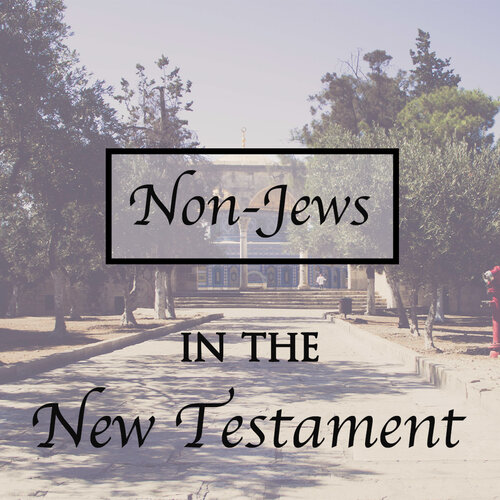I am fascinated by the examples in the New Testament of non-Jews as they relate to Yeshua (a Jew) and the Jews who made up the foundation of Christianity. As we, non-Jews, return to Israel and the Jewish people, we would do well to model our lives after those who loved Israel and the Jewish people 2000 years ago.
The Canaanite Woman (Matthew 15:21-28)
I believe there will be a day when Christianity will again understand the critical importance of recognizing the Messiah as the Son of David and all that this infers. After all, it was the angel who said to Mary, “…The LORD God will give Him the throne of His father David and will reign over the house of Jacob [Israel] forever …” (Luke 1:32, 33) Later in Luke 24:27, Yeshua brought hope to those who longed for the redemption of Israel (Luke 24:21) through Moses and the prophets – all of which validated the angel’s message to Mary.
This Canaanite woman must have shared the same passion for Israel and its future restoration as the Jews who surrounded her. She approached Yeshua as someone who was approaching a king: “Have mercy on me, O Lord, Son of David!”
His disciples, those who intimately followed Yeshua, urged Him to send her away. We would expect, as with other accounts, that Yeshua would have rebuked his disciples and embraced the woman and her daughter. But He answered her request in what seemed to be a very un-Christ-like manner: “I was not sent except to the lost sheep of the house of Israel.”
Her reaction was not a desire to separate herself from the house of Israel but the extreme opposite. She was willing to accept the lowest place at the King’s table and the nation He ruled. Are we, as non-Jews, willing to humble ourselves as this woman who so desperately desired to be part of the kingdom of Israel and fully accept the One who would rule over it? Are we willing to take a servant position lower than a dog?
Has God’s promise to Abraham, Isaac, and Jacob somehow evolved into some other reality than she understood, or does God’s Word never change?
The Centurion Soldier (Luke 7:1-10)
My second example seems to take a different route in pursuit of the King. The Canaanite woman seemed to be fully focused on the Messiah Son of David, but the non-Jewish centurion soldier invested with his hands and his heart into the Jewish people and their community. As the account unfolds, it is clear that his pursuit and love for the Jewish people stirred the heart of Yeshua.
The Jews pleaded on behalf of the centurion in verse 3. They begged Him in verse 4, “He is deserving!” In verse 5, they said, “…for he loves our nation, and has built us a synagogue.”
And here’s the kicker: “Then Yeshua went …” Motivated by this man’s love for the Jewish people and the Jewish nation – He went – He healed.
Coming out of the replacement world of Christianity is difficult. Who would have the courage to click a link in this article to fund a new synagogue? And if there were a synagogue built for the Jews, how many Christians would refer to it as the “Synagogue of Satan”? Have we as Christians been led down a road to hate the very family of Yeshua – even to the point of profaning the Holy Word of God in Revelation 3:9?
To the one who loves the Jewish nation and built a Jewish synagogue, Yeshua says, “…I have not found such great faith, not even in Israel!” This was not a slam against Israel; it was the reaction of a King stunned by the unconditional love of a man from the nations.
Cornelius – The other Centurion Soldier
Acts 10:22 says, “Cornelius the centurion, a just man, one who fears God and has a good reputation among all the nation of the Jews …” We gain a reputation with our actions.
Think of people you know and how you feel about them based on your relationship. Cornelius earned a good reputation.
If we, as Christians, are seeking the outpouring of the Holy Spirit, there must first be a strong love and attachment to the Commonwealth of Israel. Thank God that the message of Acts 10 was not about the freedom to eat pork and buzzards. It was as Peter said, “God has shown me that I should not call any man common or unclean.” (Acts 10:28)
Brothers and sisters, it is only when we join ourselves to Israel – when Jerusalem becomes the “Desire of all nations,” as the Prophet Haggai declares – that we will see the power of God manifested.
“But in every nation whoever fears Him and works righteousness is accepted by Him. The word which God sent to the children of Israel, preaching peace through Yeshua.” (Acts 10:35-36)
The moment Peter spoke these words to Cornelius, the Holy Spirit fell on his entire household. The household is the building block for the nation. In every gospel, Yeshua dramatically agreed with the prophecy through Isaiah that the Temple in Jerusalem would one day become a house of prayer for all nations.
Together, we will reach the nations and draw many hearts to love the Jews and their nation like our New Testament examples.
The Spirit and the Bride say, “Come!” (Revelation 22:17)

